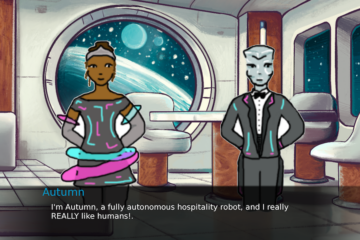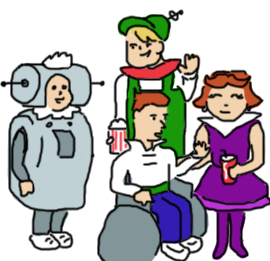I primarily write science fiction, but I have long read fantasy and enjoyed it. You would think I’d be able to write fantasy as easily as science fiction – just turn the spaceship into a unicorn, right? The robot into a dwarf?
Turns out, it’s not so easy. I started trying to sell fantasy stories at the same time I started trying to sell science fiction ones, but never had the same success. It wasn’t like I was ignorant of the genre; I read popular, current fantasy. You want medievalism? I’ve been an amateur medieval researcher for decades! I can talk your ear off about how they made cloth in the fifteenth century! Why couldn’t I make fantasy short fiction that sold?
Well, I recently succeeded with a short fantasy story, but the editor had extensive notes, and I realized as I read them that I was not writing in a fantasy REGISTER. It was a problem of tone, and my amateur historian credentials were actually working against me.
“This is how they talked in Medieval Europe” is not an excuse
I disdain using too specific or anachronistic language when talking about material culture. A hair net is a hair net, not a caul, because caul can also mean a close fitting cap. Don’t get me started on “Shirts”.
Which is to say, when I write in a fantasy setting based on 15the Century Early Modern Europe, I’m going to have people call houppelandes gowns and chateaus houses.
I had a bone to pick with exoticising the past because I wanted to understand its delicious mundanity, its kitchen spoons and home repairs. Also, I have an aversion to jargon – you would not believe how many arguments I’ve witnessed over which specific esoteric term to use for which specific object when all that those terms do is separate the “in group” academic from the average person just wondering how a thing was made, be it a catapult or a cap.
So, when this editor told me I couldn’t use “purse” because it was “too modern” I got a big bug up my butt and ranted to my husband for half an hour about Chaucer’s “Complaint to His Purse”.
Then I calmed down and checked my ego and thought about it.
People read fantasy for an exotic experience, not a mundane one, and to most modern readers, a “purse” is a decorative shoulder-bag worn exclusively by women, not a pouch worn on the belt, regardless of the fact that both are literally called that.
I’m not trying to educate a class on how language was used in the early modern era. I’m trying to entertain people who want to sink into an fantasy landscape different from their daily lives.
Tone and Word Choice
Nisi Shawl teaches a great class on word choice. They write this sentence on the board:
I got in my car and drove to my apartment.
Then they invite the students to replace those two words and see how the setting and genre of the story change.
I got in my hoversled and drove to my unit.
I got in my hooptie and drove to my pad.
I got in my Porsche and drove to my condo.
Word choices like these paint a picture. A word has more weight than its primary meaning. The Porsche and the hooptie are both cars, but I am picturing very different styles of car, with more or less personalization, different socio-economic backgrounds. Hell, I’ll admit it, I assume the Porsche driver is a jerk. All these preconceived ideas I have about the sort of person who drives a particular type of car are hitching a ride, and they aren’t even chipping in for gas.
Much like when I write “purse”, people can’t help but picture their momma’s purse. If I change it even as mildly as “coin purse” (the choice I eventually made to meet the editor’s request) you are more likely to see a coin-holding-belt-mounted-pouch.
Nothing is written in a vacuum. Words themselves are nothing more than a shared analogy, sounds we have agreed upon to have certain meanings, and other meanings stick to them like burrs stick to your clothes as you walk through a field.
Here is a list of words I was asked to change in my fantasy piece (and in my novel The Gods Awoke, too):
| “Too Modern” Word | Changed To |
| apartment | chambers |
| trip | journey |
| hit on | flirt |
| moves | overtures |
| get | buy |
| insanely | breathtakingly |
| counter | sideboard |
| organic | natural |
You get the idea. Some were surprising to me, like “I get a snack” being more “modern” than “I buy a snack,” but ultimately, I am writing for an audience, not myself, and getting direct feedback from that audience on what they want is priceless. How many of my fantasy stories had been rejected simply because I had the priestess take a trip to her apartment instead of journey to her chambers?
So it was all about calling a robot a dwarf all along?
Not exactly.
The reasons we make these word choices are to build up a mood, an atmosphere. The question is, what is the atmosphere of fantasy?
Way back in high school, I read a quote that stuck with me (though the author’s name escaped my memory.)
Science Fiction is the impossible made possible; fantasy is the possible made immpossible.
(Edit: Joseph Radding provided the citation: Rod Serling )
For example, flying faster than the speed of light is impossible, but a science fiction story will propose a plausible-seeming device based on real physics to make it seem possible.
Flying itself is possible, requiring a couple hundred bucks and a trip to the airport, but a fantasy story will turn flying impossible – by eliminating the plane and having a person fly without wings.
There are of course different types of fantasy, but there is this root concept – something in the story will be inexplicable, unexplainable, magic. Something will be beyond our ken, unable to be grasped and understood.
My instinct to use plain language likely is tied to my preference for science fiction, for making things graspable and explicable.
Capturing a sense of wonder can be as simple as watching which words you choose.
But I’m not writing European Fantasy!
Honestly, the short story above wasn’t meant to be in Europe or even a Europe-like setting. It’s based on my novel The Gods Awoke, which takes place in a land I envision as something like Syria after being conquered by people from North Africa. BUT you wouldn’t know that if you didn’t read my incredibly pretentious personal notes. (I am too kind to inflict my Silmarillion on the world.)
English is, well, spoken by the English, so the assumption of European meanings is in a way built-in.
My own desire to call-a-purse-a-purse hid any pretense to Syrian-ish-ness, and I shortly abandoned my research into the area for pure invention because that takes less work, but I do feel we need to talk about a dark side of “exotic” word choice, which is, frankly, exoticism can be kinda racist.
My favorite illustration of how this works is to reverse it. I can imagine reading a story about a middle-class white American chick that overly exoticises my lived experience like this:
Mary “Apple Pie” Smith dug into her french fried potatoes – just like mom used to make, twice cooked in a deep fat fryer – with her four-tined flat metal “fork” with the sharp, stabbing motions the implement required.
I dunno it seems to happen a lot with food, so I went there. The point is, Mary Smith wouldn’t really think about it that way, so don’t have your character from another culture think about their native foods that way, either.
In this, personally, I will stick by my plain-speaking guns. Consider it a caveat.
So how do I start with tone?
Sit down in front of your blank page. Jot down some words that evoke the mood you’re going for. For the sake of this exercise, I’ll go with the feeling of being at the beach on a hot summer day:
salt-spray, seagull, sandcastle, undertow, lighthouse, sun, long, lazy
Make sure you get some verbs in there
Soak, bleach, splash, swim, flounder
Now, let’s start the story, go ahead and write those active sentences, a character in a place doing things, but then look back and see what words you can replace to better reflect the tone. For today’s exercise, I’m writing Little Red Riding Hood on the Beach.
Once upon a time, there was a little girl who had a red cloak she always wore.
Down by the shore, there was a beach bunny who had a red cover-up she never went without.
… and so on. I haven’t made up the character, or the plot, but somehow, just those word substitutions have me seeing quite a different story ahead of me if I were to continue it. You get the idea.
Go forth and play with tone! What words give you a sense of wonder?


